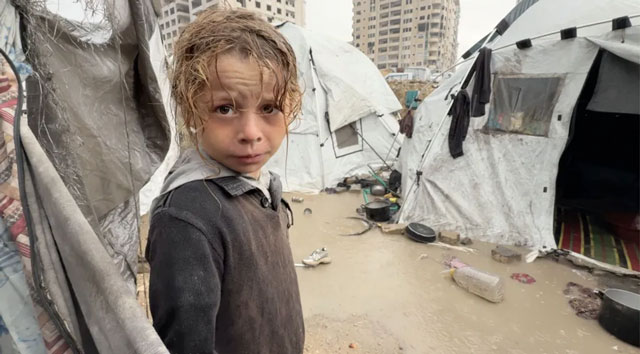Daijiworld Media Network – Gaza City
Gaza City, Nov 19: Heavy winter rains have exposed the fragile reality for millions in Gaza, with aid agencies warning that the downpour has pushed displaced families into life-threatening conditions and underscoring an urgent need for shelter supplies that remain stuck at borders.
Jan Egeland, Secretary General of the Norwegian Refugee Council, issued a stark warning: “We are going to lose lives this winter. Children, families will perish.” Egeland’s appeal followed a wave of flooding that left makeshift tents sodden, mattresses and possessions ruined, and many of the displaced facing ankle-deep water inside their temporary homes.

The humanitarian picture is grim. A recent UN assessment found more than 80 per cent of buildings across Gaza have been destroyed, with destruction reaching 92 per cent in Gaza City. The Shelter Cluster led by the NRC estimates roughly 260,000 families — about 1.5 million people — urgently need emergency shelter assistance to survive the season. Yet aid groups say they have managed to move only around 19,000 tents into Gaza since the ceasefire on October 10, while 4,000 pallets of vital relief — including tents and bedding — remain blocked in neighbouring countries.
“We’ve now lost so many crucial weeks,” Egeland said, criticising what he termed a “bureaucratic, military, politicised quagmire” that is preventing life-saving supplies from reaching people in desperate need. Many aid organisations say recent Israeli requirements — including new registration rules and demands for lists of local staff — have further slowed deliveries. Donor-country data-protection rules, they add, make it difficult to comply.
Inside Gaza, the human toll is plain to see. Fatima Hamdona, sheltering in Gaza City, wiped tears as rain pooled inside her tent. “My children are already sick and look at what happened to our tent… We don’t have food — the flour got all wet. Where do we go? There’s no shelter for us now,” she told a BBC freelancer. In Khan Younis, Nihad Shabat described mattresses and blankets ruined and said her family was sleeping under sheets and blankets because they could not afford a tent.
There are also rising fears of disease as rainwater mixes with raw sewage in crowded displacement sites. Aid workers warn that without a rapid influx of tents, tarpaulins, blankets and hygiene kits, illness and deaths may spike as families struggle through cold, wet nights.
Israeli authorities and international partners say trucks are entering Gaza daily. COGAT, the Israeli defence body that manages crossings, told the BBC it had coordinated delivery of “close to 190,000 tents and tarpaulins directly to the residents of the Gaza Strip” over recent months and that “hundreds of trucks” carrying food, fuel, medicines and shelter supplies enter Gaza each day in coordination with the UN and partners. COGAT urged international organisations to work closely with it and the new US-led Civil-Military Coordination Center (CMCC) in southern Israel, which has been established to help manage humanitarian flows under the ceasefire arrangement.
But aid groups say the pace and scale remain inadequate. Many lifesaving items are being held up either because they are classed as “dual-use” — restricted over security concerns — or because of stringent new documentation and vetting procedures. Agencies warn that thousands of pallets sitting in Egypt, Jordan and Israel represent critical stockpiles that should have already been distributed.
The blockade on some items has contributed to a thriving black market for tents inside Gaza. Aid groups and residents say stolen tents have been resold, though prices have fallen from roughly $2,700 before the ceasefire to about $900–$1,000 with a small increase in supply. Still, for families who have lost everything, that price remains out of reach.
Humanitarian leaders are urging immediate, practical steps: unblock the stalled pallets; allow vetted international agencies to distribute shelters quickly and fairly; and prioritise the most vulnerable families. With a donor conference on Gaza reconstruction looming in Cairo, Egeland warned that long-term pledges will be meaningless unless people survive the coming weeks. “They need a tent today, they don't need a promise of a beachfront structure in five years,” he said.
On the ground, displaced residents hang on to hope that the emergency response will scale up. “We pray for this war to be fully over, and for everyone to return to their homes,” said Rami Deif Allah in Gaza City, drying soaked mattresses in a weak sun. “Even if our houses are gone, with our sweat and blood we will rebuild. Living out on the streets is unbearable.”
Correction (18 November 2025): An earlier version of this piece incorrectly stated that 44,000 pallets were blocked; the correct figure is 4,000 pallets.